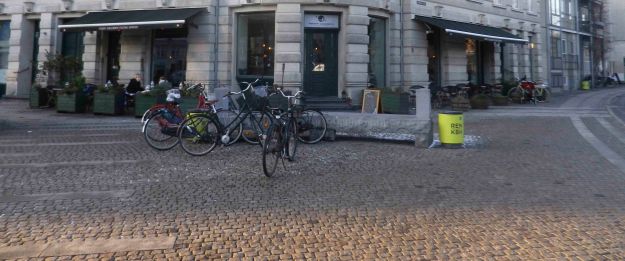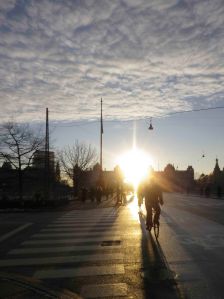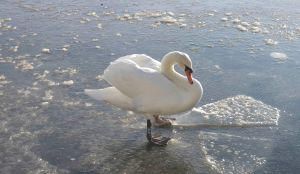
Pussy Galore is one of the cafes in my neighbourhood, right on Sankt Hans Torv. It will be lovely sitting outside during long summer nights. At the moment the outdoor settings are mainly used for smokers pushed outside by smoking laws. But as for staying here all day writing – I don’t think I can afford it! Photo: Lone 2015.
As I settle into my reverse expat experience of my home country here in Copenhagen, I picked up Hemingway’s A Moveable Feast (1964), written about his time as a young, poor writer in Paris with his first wife, Hadley, and son.
I have never read a word of Hemingway before and my knowledge of him was quite vague and second hand. But he kept cropping up as someone to read for an example of simple language and so I plunged in. I was not disappointed.
It is an easy read, though sometimes the narrative is fractured, as memoirs can be. From time to time the short book reads like elaborate name dropping. Gertrude Stein here, James Joyce there, a bit of Picasso and a dim view of Scott Fitzgerald, the person, and his mad wife Zelda. He names streets, cafés and hotels and I want to go to Paris to experience the artist community he is part of. This was a time, Hemingway claims, when there was no official uniform for the artist uniform and one could wear what one pleased, when sitting in cafés all day long, bent over a notebook with a pen, nursing a café creme while the waiters swept and cleaned up.
In this novel the gems about establishing a writing practice may be mere wall paper to most readers. But these were the bits that I found most interesting. Hemingway realises that his obsession with winning at the races interferes with his writing practice because to earn a living that way one must know much more about horses and acquiring that knowledge takes time away from creating good writing from which to earn a living. Perhaps my equivalent is the temptation to find a ‘real job’ to supplement our savings (and to be easily able to explain what I do with my days), but this too would take time away from writing. I repeat to myself: I am a writer.
Hemingway’s clearest writing advice is to work until something has been written and stop only when you know what is going to happen next. If stuck, he would remember:
Do not worry. You have always written before and you will write now. All you have to do is write one true sentence. Write the truest sentence that you know. (p12)
By truest sentence he meant a sentence that he knew or had seen or heard someone say – a simple, declaratory sentence. He called elaborate writing scrollwork or ornament that could be discarded.
At some point Hemingway’s writing practice involved leaving the flat to go to the local café to write, hoping that he would not meet anyone to disturb his flow. His wife would also go out and leave their young son in his crib with the cat, F Pussy. While this would have social workers well concerned in this century, it seemed accepted practice then. Until the flat got too cold for the baby to stay in during winter. Then the family went skiing in the Alps.
Hemingway also advises to stop working and stop thinking about the work between working, so as to let the subconscious work on it. He would then be able to listen to the conversation of other people and to notice things. Using his writerly sense.
For someone so poor, Hemingway consumed an inordinate amount of coffee, meals and wine in the cafés of Paris. But maybe those cafés were affordable and had a different business model to cafés in Copenhagen nearly 100 years later. Daily coffee and lunching in the plentiful cafés in my local neighbourhood would soon deplete our savings. But also, Copenhagen coffee is not that good: I have come to realise how spoilt for good coffee we are in Brisbane. Rather than the smooth drop with well frothed milk and a touch of real chocolate sprinkles that I know from my favourite Brisbane coffee joint, John Mills Himself, a Copenhagen cappuccino is a crass affair with none of the sweetness. And expensive too – about twice the price I pay in Brisbane.

My routine involves walking after we get out of bed. This morning the sun was out. Photo: Lone 2015.
In my attempts to write, I have tried to establish a writing practice. Sometimes, I leave the flat to write, not because the flat is cold, but because I need to get out. I might sit in the foyer of the Black Diamond, the Royal Library building on the canal front, where I listen to the conversations of students on progress of their thesis, the hearing of their disputation or their new love. If there are other writers and artists around, they are not wearing a recognisable artist uniform.
I also leave the work to do other stuff – my husband and I visit galleries and museums and we walk the streets of Copenhagen, noticing architecture, nature, people and graffiti. With my writerly sense.
But I need more discipline to write enough every day. Or I feel as useless as Hemingway did on an escapade with Scott Fitzgerald – a day wasted not writing.



I’m loving your writing Lone! And I really enjoyed reading about your writing in this post too. Enjoy that daily practice and good luck with the coffee quest…
LikeLike
Thanks Iona – I think I owe you a post on Copenhagen art deco and ‘funkis’ architechture 🙂
LikeLike
Never read Hemingway either…I think it has put me off, that he has been described as a male chauvinist. None the less, I think his thoughts about writing practises makes very good sense – even to me as a so called copy writer in advertising. The strangest title ever, but also not the least pretentious…lets you know what you do in its essence. Copy. Not a novel or a short story. Just copy 🙂 Sets you free!
LikeLiked by 1 person
Hi Lone,
Best wishes for the daily practice.
So many swear by ‘The Artist’s Way’ by Julia Cameron.
Also, ‘The Paris Wife’ by Paula McLain – looks at Hemingway’s Paris time through another lens.
I am very much enjoying your posts and gaining an insider view into Copenhagen.
LikeLiked by 1 person
Thanks for the tip! It is second time someone mentions The Artist Way – so I am on the lookour for that one. Hope all is good. L.
LikeLike
Lone, I see what you say about his chauvanism – philandering and with four wives and all. Nothing as lofty ever kept me from reading Hemingway – more a focus on Danish and Australian authors was the cause. But I figure if I am to write fiction, I better read some classics?
LikeLike
Pingback: An old man and a determined woman | Pied-à-terre CPH
Pingback: Writing in the foothills | Pied-à-terre CPH